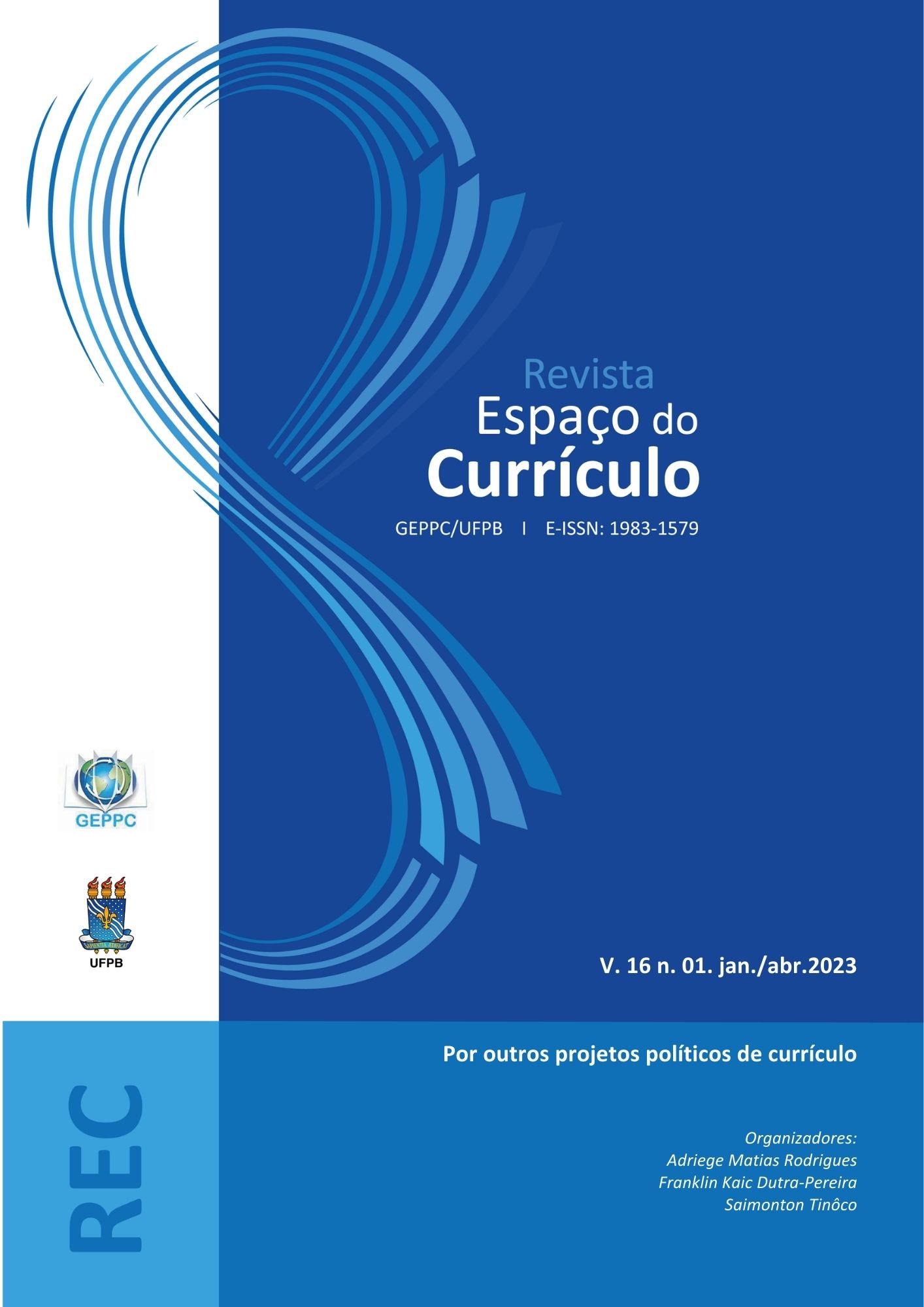CULTURAL CURRICULUM AND BIOLOGY IN THE AMAZON
Critical analysis of the Curriculum Document of the State of Pará
DOI:
https://doi.org/10.15687/rec.v16i1.66056Keywords:
Amazonian cultural curriculum, DCEPA-EM, Pará, Biology CurriculumAbstract
In the context of changes related to the structure of the last stage of basic education in the country, we assist movements to reorganize curricular documents within different regions for the implementation of the so-called new secondary education. With the aim of establishing an education of homogeneous knowledge and more thought out for the market, the reform of secondary education moves away from schools the discussions that involve a multicultural society. We have in this article the purpose of approaching reflections about culture and the Amazon, educational spaces and especially the curriculum. More specifically, this study aims to analyze the influence of Amazonian knowledge in the Curricular Document of the State of Pará (DCEPA-EM), in the field of Biology, for this we develop a documental research, of a qualitative nature. Our investigative lenses are instigated by authors who discuss the field of cultural curriculum and Amazonian education, through which we trace the theoretical reflections that are sewn by the weightings resulting from our analyses. The results indicate that, because we are located in the state of Pará, located in the Amazon region, the teaching of biology could be closer to knowledge about this biome, its rich fauna and flora, about the rivers and the forest that make up and surround our identities. Amazonian cultures and that DCEPA-EM, on the one hand, uses expressions that seem to be superior to Amazonian cultures, but continues to align itself with the demands imposed by the marketing educational political movement.
Downloads
Metrics
References
BARDIN, Laurence. Análise de conteúdo. São Paulo: Edições 70, 1977.
BELTRÃO, J. A. NOVO ENSINO MÉDIO: O rebaixamento da formação, o avanço da privatização e a necessidade de alternativa pedagógica crtítica na educação física. 2019. 269 f. Tese (Doutorado em Educação) – Faculdade de Educação, Universidade Federal da Bahia, Bahia, 2019.
BRANDÃO, Carlos Rodrigues. A educação como cultura. Campinas: SP: Mercado das Letras, 2002.
BRASIL. LDB: Lei de Diretrizes e Bases. 3 ed. Brasília: Senado Federal, Coordenação de Edições Técnicas, p. 59, 2019.
BRASIL. Ministério da Educação. Base Nacional Comum Curricular. Brasília, DF: Ministério da Educação, 2018.
CELLARD, A. A análise documental. In: POUPART, J. et al. (Orgs.) A pesquisa qualitativa: enfoques epistemológicos e metodológicos. Petrópolis: Vozes, 2008.
COSTA, R. P. C. OLIVEIRA, D. B. CURRÍCULO E CULTURA: o contexto amazônico na prática educacional. Revista EDUCAmazônia - Educação Sociedade e Meio Ambiente, Humaitá. Ano 9, Vol IX, Número 2, Jul-Dez, 2017, Pág. 138-162.
FORQUIN, J. C. Escola e cultura: as bases sociais epistemológicas do conhecimento. Porto Alegre: Editora Artes Médicas, 1999.
HAGE, Salomão Mufarrej. (org.) Educação do Campo na Amazônia: Retratos de realidade das escolas multisseriadas no Pará. Belém: Gráfica e Editora Gutenberg, 2005.
IBGE. Síntese de indicadores sociais: uma análise das condições de vida da população brasileira: 2020. IBGE, Rio de Janeiro, 2020.
KRASILCHIK, M. Prática de Ensino de Biologia. 4 ed. São Paulo: Edusp, 2019. 200p.
LUDKE, M. ANDRÉ, M.E.D.A. Pesquisa em educação: Abordagens Qualitativas. Rio de Janeiro, 2. ed. E.P.U., 2017.
MINAYO, M.C.L. (Org.). Pesquisa social: teoria, método e criatividade. 32. ed. Petrópolis: Vozes, 2002.
MOREIRA, Antônio Flávio; SILVA, Tadeu Tomaz. Currículo, cultura e sociedade. 12. ed. São Paulo: Cortez, 2013.
NEIRA, M. G. O CURRÍCULO CULTURAL DA EDUCAÇÃO FÍSICA: pressupostos, princípios e orientações didáticas. Revista e-Curriculum, São Paulo, v.16, n.1, p. 4 – 28 jan./mar. 2018. Programa de Pós-graduação Educação: Currículo – PUC/SP.
NEIRA, M.G.; NUNES, M.L.F. Educação Física, currículo e cultura. São Paulo: Editora Phorte, 2009a.
OLIVEIRA, Ivanilde Apolucena. TEXEIRA, Elizabeth (Org.). Referencias para pensar aspectos da educação na Amazônia. Belém: EDUEPA, 2004.
PARÁ, Documento Curricular do Estado do Pará – Etapa Ensino Médio: Volume II. Belém: SEDUC-PA, p.522. 2ª Ed. Belém: Comissão ProBNCC. Pará, 2021.
PRODANOV, C. C. FREITAS, E. C. Metodologia do trabalho científico: métodos e técnicas da pesquisa e do trabalho acadêmico. Editora Feevale: Rio de Janeiro. 2013.
SACRITÁN, J. G. O Currículo: uma Reflexão sobre a Prática. 3. ed. Porto Alegre: Penso, 2017.
SILVA, Tomaz Tadeu da. Documentos de identidade: uma introdução às teorias do currículo.2. ed. Belo Horizonte: Autêntica, 2005.
SILVA, Tomaz Tadeu da. O Currículo como Fetiche: a poética e a política do texto curricular. 1ª Ed. 3ª reimp. – Belo Horizonte: Autêntica, 2006.
SOUZA, A. R. A teoria da agenda globalmente estruturada para a educação e sua apropriação pela pesquisa em políticas educacionais. RBPAE, v. 32, n. 2, p. 463-485, maio/ago. 2016.
TORRES SANTOMÉ, Jurjo. A educação em tempos de neoliberalismo. Porto Alegre: Artmed, 2003.
Downloads
Published
How to Cite
Issue
Section
License
Copyright (c) 2023 Curriculum Space Journal

This work is licensed under a Creative Commons Attribution 4.0 International License.
By submitting an article to Curriculum Space Journal (CSJ) and having it approved, the authors agree to assign, without remuneration, the following rights to Curriculum Space Journal: first publication rights and permission for CSJ to redistribute this article. article and its metadata to the indexing and reference services that its editors deem appropriate.
















